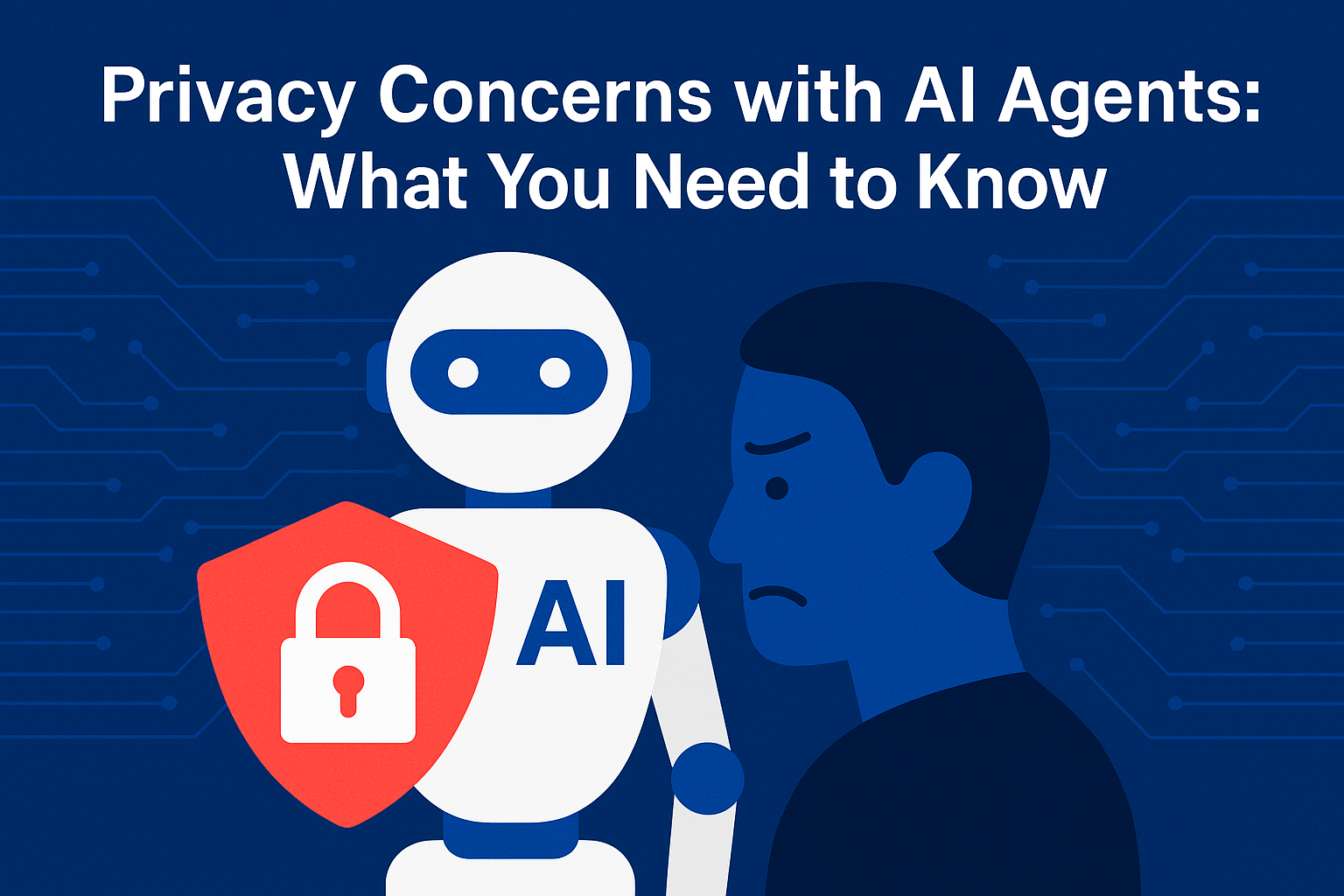Privacy Concerns with AI Agents: What You Need to Know
Applying Artificial Intelligence (AI) has become a common business practice for almost every organization from providing customer service to enhancing personal productivity. Such technological advancements not only make processes easier but also bring potential risks along. As machine learning algorithms are used to process and analyze data for better decision-making, the aspect of data security paves way for issues related to compliance and privacy. Unless stricter policies are enforced upon AI agents, the situation remains volatile.
Setting up the right approach and a definitive strategy for agentive AI with respect to data collection and data sharing will not only streamline data access but also reduce human liability.
People are concerned about privacy with AI agents because these systems collect, store, and process vast amounts of personal data, often without full transparency or control. What are the privacy concerns with AI agents that need to be addressed immediately in order to conduct safer business practices?
Abstraction
Users are not aware that how the decision-making process is implemented.
Data Sharing and Third-Party Involvement
AI agents often interact with multiple systems and organizations. Some companies may sell or share user data with advertisers, governments, or other entities without clear consent. Though an AI agent is independent, eventually it is a human-programmed model. The results produced as such will expose data to undesired elements. At a time when data breaches are considered serious, no organization would ever like to find themselves cornered. So, an AI model must be trained regarding
- The type of data shared – sensitive, encrypted, or remodeled
- The way access is provided – biometric or password-enabled
Agentive AIs perform at their best with such protocols in place as there will be minimum dependency on the critical data involved.
According to Metomic, a data security platform for SaaS, GenAI and Cloud, one of the top three security risks associated with Gen AI is Data Privacy and Confidentiality. It also provides strategies to mitigate them.
Data Privacy and Confidentiality
Gen AI systems often require vast amounts of data to train and function effectively. This data can include sensitive and Personally Identifiable Information (PII). If not handled correctly, there’s a risk of exposing confidential data, leading to privacy breaches and regulatory penalties.
Samsung was an early and notable victim of just such a data leak incident. The tech giant was forced to ban the use of GenAI after staff, on separate occasions, shared sensitive data, including source code and meeting notes, with ChatGPT.
Management Strategies
- Data Encryption: Ensure that all data, both at rest and in transit, is encrypted. This minimizes the risk of unauthorized access.
- Anonymization: Implement data anonymization techniques to remove identifiable information from datasets before using them in AI training.
- Access Controls: Use robust access control mechanisms to ensure only authorized personnel can access sensitive data. Role-based access control (RBAC) is a practical approach to limit data exposure.
Learn about other security risks highlighted by Metomic: https://www.metomic.io/resource-centre/understanding-ai-agents-data-security
Unauthorized Data Access and Hacking
AI systems store sensitive personal and financial information, making them attractive targets for hackers. This can lead to identity theft, financial fraud, and other cybercrimes. Also, AI agents, when pressed into action as part of optimizing organizational efficiency tend to process data that is not just unnecessary but also inviting risks related to data infiltration.
- Healthcare – Patients’ data might be compromised for clinical trials or drug production
- Insurance – Bankers secure unethical access to investors’ data for personal gains
- Finance – Stock market results are influenced heavily with data obtained without consent
As per the global data access protocols, any customers’ data had to be utilized within the permissible limits only after obtaining consent from the concerned.
Data Infiltration and Surveillance
Security cameras installed at public places are helpful in numerous cases that have been unresolved for a long time. However, the flip side indicates that the data captured through CCTV footages might result in unwanted encroachment into one’s privacy. Infiltrating of personal data with AI agents must be monitored and limited to ensure that the data is rightly used. In particular, this might result in wrongful surveillance leading to the confinement of people not related to any offence or act.
Leakage of Data Unintendedly
How safe is data when AI agents access them is a million-dollar question? Though the actual reason for accessing specific healthcare data for instance such as doctor prescriptions or patients’ diagnoses might be different, the same data could be leaked to more resources than intended. Accidental leakage of data is a cause of great concern as the AI agents are not aware of it, at all. The results fetched by ChatGPT against a specific query might be an unintended invasion of another’s data. Currently, there is no proven mechanism in place to contain such data leaks.
How to Address Privacy Concerns of Using AI Agents Effectively?
Training agentive AIs to display responsible behavior is one of the best ways to address data privacy challenges. Given below are some of the options that can be immediately adopted and implemented.
- Risk Awareness: Feed the agents with the consequences of obtaining or using data.
- Data Collection: Set limitations to the type of data and, most importantly, the extent to which it is collected by using strong privacy settings.
- Data Sharing: Opt out of unnecessary data sharing wherever and whenever possible.
- Data Advocacy: Urge for stronger AI regulations to ensure ethical use of data.
- Data Cognizance: Be mindful of the data being shared with the AI agents.
- Consent for Data Processing: Accessing a person’s data after seeking consent exclusively is one of the safest data management practices
For more details on the compliance and regulatory considerations: https://www.metomic.io/resource-centre/understanding-ai-agents-data-security# what-compliance-and-regulatory-considerations-should-businesses-be-aware-of-when-using-ai-agents
Apart from the above, there are other alternatives as well to maintain data privacy while being accessed by AI agents such as the implementation of best data security policies, the protection of sensitive data, and the maintenance of records about data access and the reasons for accessibility.
Do you want to know how to overcome privacy concerns while using AI agents? Reach out to us at [email protected]





